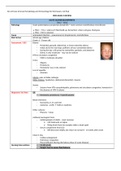How does Shakespeare present the theme of power in ‘Macbeth’?
You must consider language, form and structure and refer to the context (social/ historical/generic) in your
answer.
Throughout Shakespeare’s ‘Macbeth’, power is a prevalent theme which is explored through a range of
characters and relationships. We see how power is used to manipulate and to control and also how the
attainment of power deeply affects those who attain it, namely, Macbeth.
One of the facets of power that Shakespeare reveals to us is the idea that the extent to which someone
can exert their power over you is determined by your preexisting characteristics. This is demonstrated
through the relationship between The Witches, Macbeth and Banquo. Whilst Macbeth and Banquo share
the same encounter with The Witches, it is evident that Macbeth is affected by it much more than Banquo.
For example, Banquo notes that Macbeth, upon meeting The Witches, ‘seems rapt withal’. Macbeth
himself even demands: ‘Stay you imperfect speakers. Tell me more.’; despite the fact that Macbeth
acknowledges them as flawed, he still wants to hear more from them. Contrastingly, Banquo states that
‘the earth hath bubbles....and these are of them.’ and recognises them as ‘instruments of darkness’ who
‘win us with honest trifles, to betray’s/ In deepest consequence.’ Macbeth is counterpointed by Banquo,
because of their greatly differing responses to the same situation, which implies some innate capacity for
evil within Macbeth. As a result of this, he is drawn to The Witches, therefore, giving them the ability to
exert power over him, whereas Banquo, who is depicted as a good and moral character, remains
sceptical of The Witches. Therefore, Shakespeare delineates Macbeth as tragically flawed from the
earliest scenes in the play and desire for power or blind ambition is central to this characterisation.
Another power dynamic in Macbeth is between The Witches and Macbeth. As the play progresses, the
influence of The Witches on Macbeth becomes apparent. He increasingly uses asides, which link to the
idea of deception; a key aspect of The Witches’ characterisation - as demonstrated through antithetical
phrasing such as ‘Fair is foul and foul is fair’. Macbeth mirrors this phrasing, commenting that The
Witches ‘Cannot be ill, cannot be good’. Additionally, Macbeth remarks ‘Stars, hide your fires,/ Let not
light see my black and deep desires.’ This mirrors the rhyme of The Witches, for example, ‘When shall we
three meet again?’/ In thunder, lightning, or in rain?’, but also his description of his ambition makes it
sound unnatural, which is contrasted by the natural rhyme. A similar contrast is found between The
Witches’ unnatural trochaic meter - ‘Double, double, toil and trouble/ Fire burn and cauldron bubble.’ -
and their connection to nature, signified via references to ‘Graymalkin’ and ‘Paddock’. In this way,
Shakespeare shows the power The Witches have over Macbeth through the influence they have on his
speech. Furthermore, since the Jacobean audience, who literally believed in witchcraft, would have been
terrified of The Witches, by showing these similarities of Macbeth’s speech with theirs, Shakespeare
builds a sense of Macbeth’s evil and, therefore, develops his characterisation through this link.
Another important example of power Shakespeare explores is Lady Macbeth’s power over Macbeth.
From her first arrival onstage, her importance is elevated above that of a typical Renaissance woman. Her
first words are Macbeth’s, as she reads a letter from him, and he addresses Lady Macbeth as ‘my dearest
partner of greatness’. This unity and equality between spouses was highly abnormal for the Jacobean
era. As the play progresses, we see how Lady Macbeth begins to abuse this power; during their
interactions after the murder of Duncan, Lady Macbeth repeatedly asserts her dominance over him. One
way she does this is through the use of the imperative mood; she repeatedly orders Macbeth - ‘Go get
some water’, ‘Go carry them’, ‘Give me the daggers’, ‘Get on your night-gown’, ‘Hie thee hither’. This
abuse of power is also evident earlier in the play, as she uses the idea of masculinity to manipulate
Macbeth; when at first he is opposed to murdering King Duncan, she tells him ‘When you durst do it, then
you were a man./ And to be more than what you were, you would/ be so much more the man.’ Therefore,
Lady Macbeth abuses her power over Macbeth by her derogatory treatment and manipulation of him. This
power dynamic is extremely unusual for the time, but this is crucial; since Macbeth and Lady Macbeth
usurp the natural order and Divine Right of Kings in their act of murdering Duncan, Shakespeare has to
show that they are unnatural, in order to appease the Jacobean audience and show that the common
man is not capable of killing the king.
Shakespeare also portrays the damaging effects of power when it is usurped. This is depicted through the
tragic hero, Macbeth, and his transformation. After Duncan’s death, and Macbeth’s resultant kingship,
Macbeth converses with murderers and seems at one with them; both Macbeth and the murderers speak






